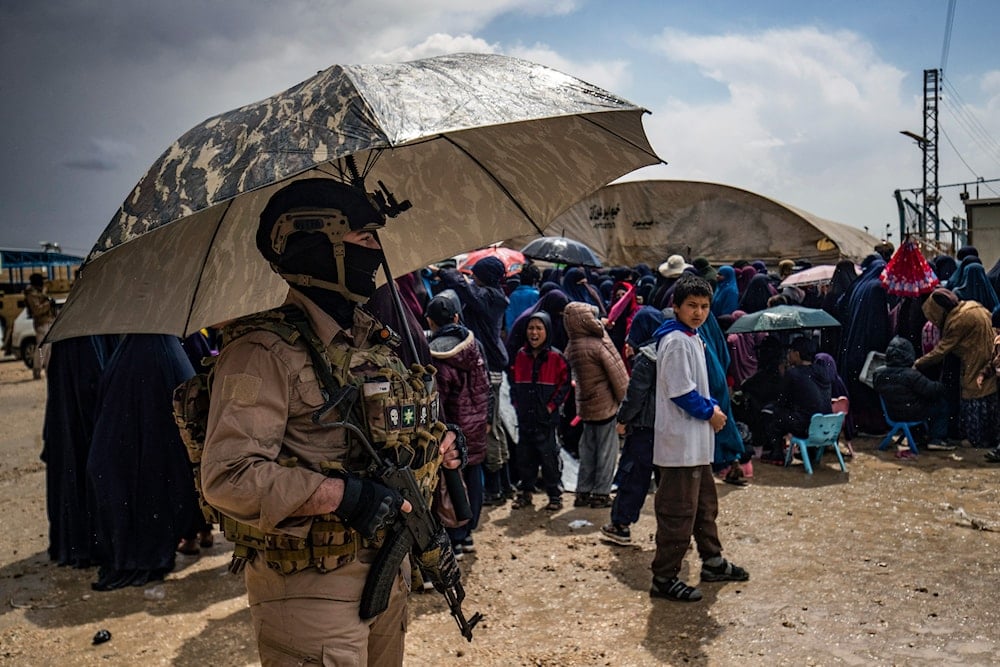Pro-Turkish forces scale back in Kurdish-majority Afrin region
A Syrian Defense Ministry official says the groups have “reduced their military presence and checkpoints” in Afrin, located in Aleppo province.
-
 Members of Syria's Kurdish Internal Security Police Force, also known as Asayesh, and the Kurdish-led Syrian Democratic Forces (SDF) stand guard during a joint security operation at Camp Roj, where foreign relatives of people suspected of belonging to the Islamic State (IS) group are held, in the countryside near al-Malikiyah (Derik) in Syria's northeastern Hasakah province on April 5, 2025 (AFP)
Members of Syria's Kurdish Internal Security Police Force, also known as Asayesh, and the Kurdish-led Syrian Democratic Forces (SDF) stand guard during a joint security operation at Camp Roj, where foreign relatives of people suspected of belonging to the Islamic State (IS) group are held, in the countryside near al-Malikiyah (Derik) in Syria's northeastern Hasakah province on April 5, 2025 (AFP)
Pro-Turkish Syrian factions have scaled back their military footprint in the historically Kurdish-majority region of Afrin, northern Syria, which they have controlled since 2018, AFP reported on Tuesday, citing a Syrian Defense Ministry official.
This development comes in the wake of an agreement signed last month between Syria’s new rulers and Kurdish representatives, allowing for the return of displaced Kurds, tens of thousands of whom fled Afrin during a 2018 Turkish-led offensive.
The official, speaking on the condition of anonymity, said the groups have “reduced their military presence and checkpoints” in Afrin, located in the Aleppo province. While their presence has not been entirely withdrawn, the official noted that authorities are seeking to relocate them to military bases, which have often been targeted by Israeli airstrikes.
Following the ousting of longtime president Bashar al-Assad by Islamist-led forces in December, Syria’s new leadership ordered the disbanding of all armed groups and their integration into the national army, a process expected to include the pro-Turkish factions operating in the north.
Turkey and its allied Syrian forces launched an operation against Kurdish fighters in Afrin between January and March 2018. The United Nations estimated that around half of the enclave’s 320,000 residents were displaced during the offensive.
Since then, human rights organizations have repeatedly accused pro-Turkish groups of committing rights violations in the region.
In a significant shift, the Kurdish-led autonomous administration, which governs large parts of northern and northeastern Syria, reached an agreement last month to merge its civil and military institutions with those of the central government.
Earlier this month, Kurdish forces withdrew from two districts in Aleppo as part of the ongoing reintegration process.
Syrian Kurdish official Bedran Kurd stated on X that the Aleppo agreement marks “the first phase of a broader plan aimed at ensuring the safe return of the people of Afrin.”
Kurdish Administration rejects Syria's new government decisions
But in late March, the Kurdish Autonomous Administration in Syria announced that it would not implement the decisions issued by Syria's newly formed government, arguing that the continued dominance of a single ruling party and the exclusion of Syria's diverse communities undermine the prospects for a comprehensive political solution.
In an official statement, the administration said it is not concerned with applying or enforcing the decisions of the new government, which it described as largely a continuation of the previous one.
It criticized the new cabinet for failing to represent Syria's demographic diversity and for maintaining centralized control, stating that this approach excludes key components of the Syrian population from political participation.
The statement warned that such exclusion hampers progress toward a genuine political resolution and that the government's current direction risks returning the country to "square one," where a single party dominates governance and obstructs any inclusive political process.
It added that repeating the mistakes of the past would only harm the Syrian people and prevent the launch of a true political transition.
The Administration concluded that any government that does not reflect the full spectrum of Syrian society cannot govern effectively or lead the country out of its current crisis.
Read more: Syria's constitutional declaration risks endangering rights: HRW

 4 Min Read
4 Min Read










